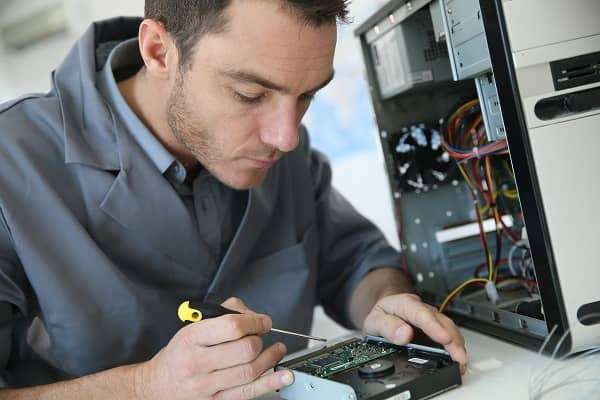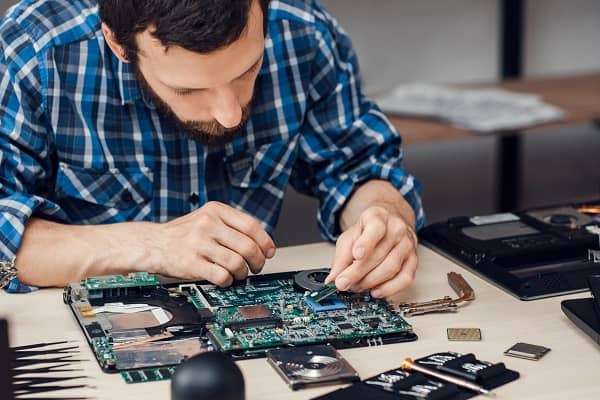Looking for a computer technician training course? Enrolling in this kind of study is a great way to secure a promising career. As long as there are computers, there will be a vital need for computer technicians.
According to 2020 statistics collected by the Bureau of Labor Statistics (BLS), over 882,000 computer support specialists are working across the United States, a number expected to spike over the next decade. With an average salary of just over $55K and high job satisfaction rates across the board, a career as a computer technician sounds like a good choice.
A computer technician training course like the ones provided by ICOHS College will provide you with the vital know-how required to successfully enter this field of work. It will teach you how to respond to computer hardware and software issues, understand technician jargon, and carry out computer diagnostics. With such expertise, you will be able to maintain computer systems and devices to a professional standard.
This article will break down all there is to know about the computer technician training, the range of courses available, necessary skills, as well as the best means to start your career as a computer servicing professional.
[toc]
How to Become a Computer Technician
Completing several computer technician courses is one of the best ways of becoming a computer support specialist. These courses provide you with essential education, licensing, and certification while teaching valuable computer management skills.
Of course, you should consider other components apart from a training program to secure a job in the field. This section will provide an overview of what is generally involved in computer technician courses and other components required to become a professional support specialist.
Education and Training

A computer technician training course will provide you with the education and training needed for various computer tech jobs. Some will involve online practice, whereas others will focus primarily on classroom training. All are likely to cover a range of different skill sets and may take anywhere between 4 and 48 months to complete.
The education and training that you’ll undergo during this time will most likely include:
Computer Maintenance
This involves maintaining computer software and hardware, fixing problems as they arise, configure systems, and preventing systems from crashing – the basics of computer support.
How to Manage Operating Systems
This will go over the fundamentals of security, how to handle input and output, the basics of memory management and file management, support for user interfaces, networking protocols, and manipulating scheduling tasks.
Systems Management
This will explain how to monitor an IT operating system, identify an issue, and ensure that systems run smoothly.
Network Security
This involves how to prevent security issues from arising and understanding the range of attacks that computer systems can be victim to, such as hacking, malware, and social engineering attacks. Network security courses will also cover web and email safety, security codes, and operating systems holes.
Programming

An important subject in all IT-related roles, most training courses are bound to include some programming lessons. This will involve learning how to command computers to perform specific tasks and creating code for system software.
Network Security Appliances
Here, you’ll learn how to manipulate network security appliances like firewalls and routers in desktop computers and how to manage the traffic that passes through them.
Upgrading Systems
This revolves around upgrading systems such as Windows, Android, iOS, Chrome, etc.
Licensing and Certification
On top of education and training, a good computer technician program will provide you with licensing and certification to verify your computer maintenance capabilities.
Some computer technician training courses, mainly associate’s and bachelor’s degree programs, will provide you with certification such as CompTIA A+.
The IT Network Specialist Certificate Program at ICOHS College will help students attain the necessary skills to pass various industry certifications including Comptia A+, Comptia Network+, and Comptia Security+.
Though the number of computer support specialists is on the rise, it’s still important to get as many qualifications as possible to secure the top positions. The primary licensing and certification to look out for when choosing a computer technician training course are as follows:
CompTIA A+
It will be challenging to get anywhere in the computer tech sector without being CompTIA A+ licensed. This qualification is a requirement for nearly all positions in the field and should be the first obtained by any budding computer technician.
The certificate signals to employers that the applicant can maintain computer systems; this includes the computers themselves and various input and output devices. It also shows that the individual can troubleshoot problems as they arise, upgrade systems whenever necessary, and set up and maintain security networks.
Candidates must pass two examinations to achieve a CompTIA A+ certificate: one multiple-choice exam and one practical test.
ITIL 4 Foundation
The Information Technology Infrastructure Library (ITIL) is a systematic framework for managing IT services. The library consists of terminologies, principles, concepts, and process models. Being able to comprehend ITIL data is important to all IT sector employees, especially computer technicians.
The ITIL framework helps set a basic IT language that all can understand. As technology constantly develops, it is essential to have a base language that all can refer to.
An employer may request an ITIL 4 Foundation certificate if the position involves working within a team or delivering an IT service for another party.
Jobs that typically require ITIL qualification include information management and service delivery management. An ITIL 4 examination entails 40 multiple choice questions that have to be completed within an hour.
Certified Information System Security Professional (CISSP)
This qualification shows a very high standard of network security capabilities. A Certified Information System Security Professional can implement all eight aspects of information system security: communications, security assessments, software development, software development security, security operations, asset security, identity and access management, and security engineering.
This qualification is necessary for a security analyst, information security analyst, and information technology auditor positions.
The CISSP examination consists of one test, which contains 250 questions. The average length of time to complete the examination is 6 hours.
CompTIA Network+
Another globally recognized technician training course, CompTIA Network+, focuses on maintaining both wired and wireless networks. Network+ will likely cover topics such as how to wire the latest networking technologies; this qualification will ensure participants can troubleshoot, configure, and maintain network devices and control such devices as routers and switches.
Network+ is recommendable for helpdesk technician, information technology technician, and information technology specialist positions. Participants are required to complete a 90-question certification exam.
Important Skills

There are several important skills that you can learn with a computer technical training course. However, some vital skills will need to be developed in conjunction with the course.
If you want to get into any IT sector, getting as much practical computer experience is crucial. Additionally, the job description of most technical positions demands that applicants possess great communication skills, both verbally and in writing, problem-solving capabilities, as well as commanding prowess with a computer toolkit.
Develop the technical and professional skills needed to install, manage and troubleshoot software in today’s market. Request more information about our IT Systems Administrator program at ICOHS College.
Here’s a more in-depth look at essential skills that will help you both in your computer technician training and getting a job afterward.
Communication
Being able to communicate technician knowledge to clients and co-workers is a central part of any tech job. Like any occupation, computer technicians work as part of a team and must communicate with and listen to their coworkers accordingly. This applies to both verbal communications as well as phone calls, e-mails, and other messaging services.
Problem-Solving
When it comes to addressing and troubleshooting tech problems, a certain degree of problem-solving is necessary. While most technical abilities become hardwired over time, systems are constantly updated, and unforeseen issues can occur. In IT, unprecedented computer problems can appear frequently, and quick problem solving will need to be applied.
Familiarization with Computer Parts
Computer technicians will often have to deconstruct and reconstruct computers to troubleshoot accordingly. It is vital to get as much computer repair experience as possible so that when it comes to taking computers and other devices apart, there is no time wasted learning on the spot. Taking a computer apart and reconstructing it is an excellent way to learn and understand its inner workings visually.
Documenting Information
Spreadsheets and statistics play a significant role in the job of a computer technician. It is expected of the computer tech to regularly record how well the systems are running and how the frequency of errors and malfunctions.
The ability to use MS Explorer, ORACLE, and Microsoft Office Suite is essential.
Job Outlook for Computer Support Specialists

According to the BLS, computer and information technology occupations are forecast to make an 11% increase by 2029. Regarding computer support technicians specifically, there is an estimated jump of 8% to be made in the U.S. by 2029. This is a faster than average rate of growth.
The need for computer support specialists is far greater than that of a computer repair role, with the job prospects for the latter expected to decline by 1% by 2029. Modern computer support specialists are expected to take over the role of the computer repairer.
Computer-based industries will continue to rise unforeseeably into the future, meaning there will always be a need for computer support specialists.
Conclusion
Completing several computer technician courses is the best means of boosting career prospects in the field. Having a wide pallet of skill sets and certifications to prove it will render your job applications a cut above the rest. The right computer technician course will provide you with the necessary knowledge to deliver expert computer maintenance, prepare for and deal with problems as they arise, and keep networks secure from cyber threats and viruses.
ICOHS College is proud to prepare students for a variety of IT jobs. We provide degree programs to ready students for careers as systems administrators and network specialists.
Scholarships and title IV funding are available for IT and other programs. Give us a call at (858) 581-9460 or email us for more information on financial assistance.
Students can also take advantage of our career counseling services to help them pursue positions that match their skills and interests. Graduates from ICOHS College will enjoy lifetime job placement assistance.
ICOHS College is accredited by the ACCET (Accrediting Council for Continuing Education, accet.org). To learn more about ICOHS College accreditations and licenses, visit our accreditation page.
FAQ
Is a computer technician a stable career?
The role of a computer technician is forever changing and adapting. New technologies and operating systems arrive, but the value of a computer support specialist remains. For that reason, being a computer technician is a highly stable career as there will always be a need for technical expertise.
What’s the best way to become a computer technician?
The best way to become a computer technician is by completing a computer technician course, gaining a degree in the field, work experience, and certification. To establish a career in computer support, you also must have a passion for resolving issues and being a good communicator.
Is becoming a computer technician a long process?
The length of time it takes to become a computer technician depends on what area you wish to pursue. Rudimentary training to become a professional computer support specialist can take anywhere between 4 and 48 months. Some more advanced coursework will take longer to complete if you decide to continue your education further.
Is being a computer technician easy?
Computer technicians are constantly learning, which would lead some to believe that it is a difficult job. Their tools are continually evolving, and learning to adapt is a big part of the job. However, if you have a passion for IT in general, adapting will become hobby-like and enjoyable.









